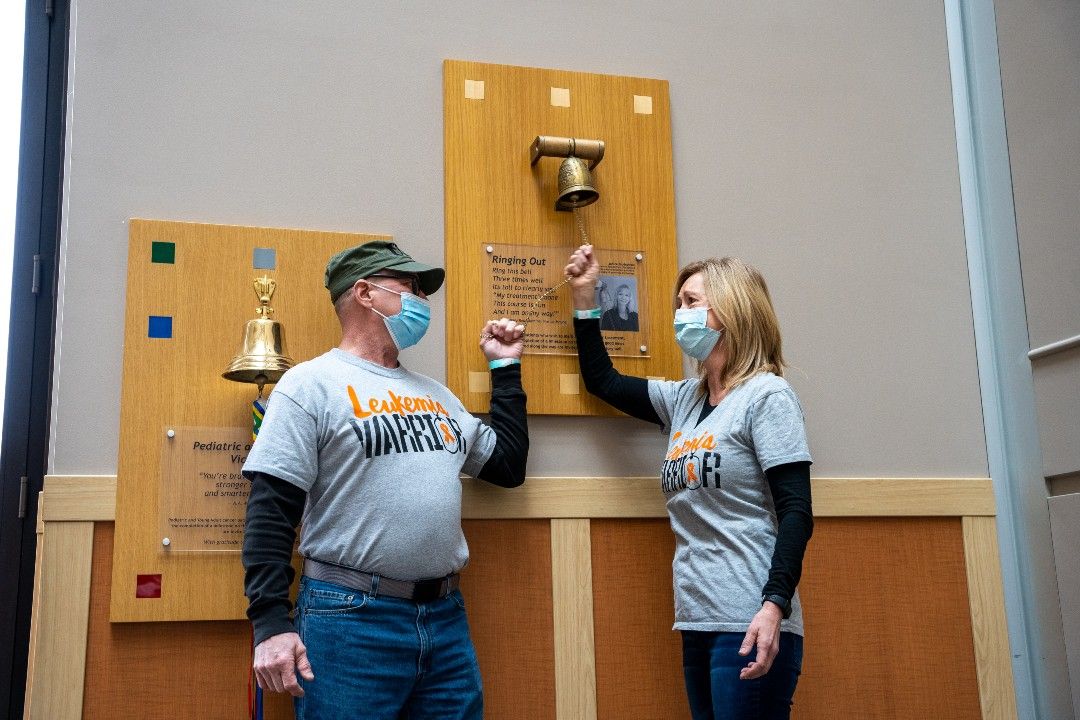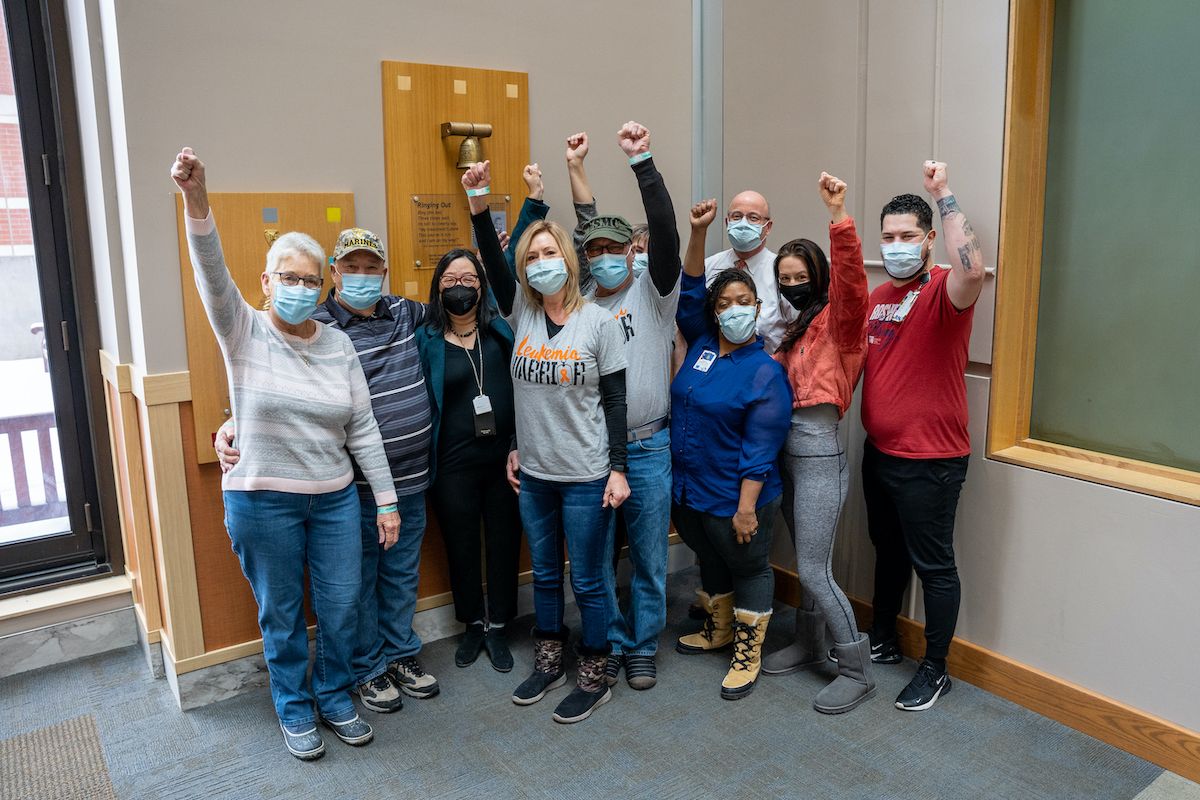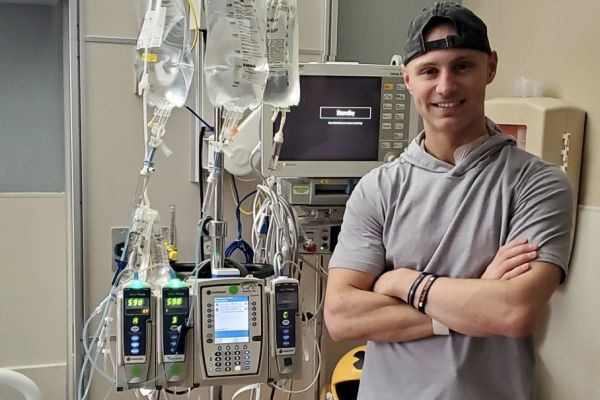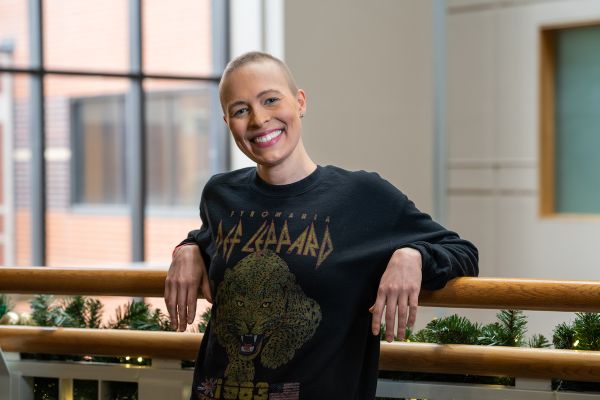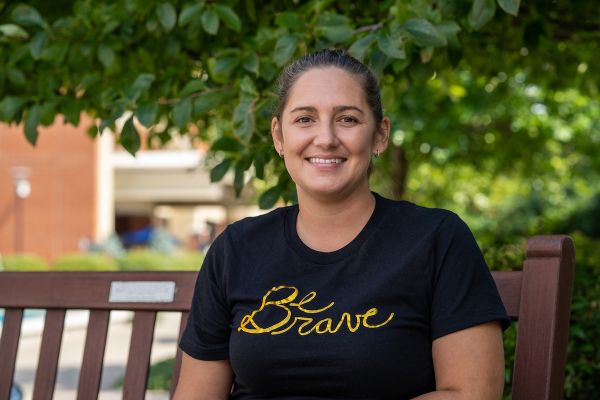Marilyn and Kevin Sittniewski have been together and married for more than three decades. They have two beautiful daughters, Christie and Kelly, a tight-knit family, friends they travel to visit and a full life of work and fun. Over the years, they’ve shared quite a lot, but they never expected to share leukemia.
Marilyn started her journey first, in 2014. Although she worked out at the gym regularly and was quite fit, she noticed she was getting tired easily and running out of energy on short bike rides in her neighborhood.
“For two weeks, I wasn’t feeling good,” she says. “I kept bruising and my trainer asked why. I said I must be walking into things. I didn’t know. I just didn’t feel good.”
She had some blood tests and her doctor’s office called with the results as she was driving to work. They asked if she could go, instead, to Millard Fillmore hospital. At the time, Kevin was in Pennsylvania on a golf trip, just about to tee off.
“When I got to the hospital, everyone was waiting for me,” Marilyn says. More blood tests were ordered. Kevin was called and told to come home. She still didn’t know what was going on until doctors told her to go to Roswell Park Comprehensive Cancer Center immediately. “The staff was waiting for me at the door. I didn’t realize how serious it was. My white cell count was almost a million. They asked me how I was still walking.” A normal white blood cell count range is between 4,500 and 11,000 cells per microliter of blood.
Marilyn was diagnosed with acute B-cell lymphocytic leukemia (ALL) and was immediately admitted to Roswell Park, spending more than a month in the hospital. In retelling the story, Kevin grasps Marilyn’s hand, remembering the fear they shared. Marilyn asked few questions of her doctors about the severity of her illness, choosing instead to focus on getting better and getting back to her life. That would take longer than they hoped, as her leukemia was difficult to treat and could not initially achieve remission; she required a bone marrow transplant. After a long search for a match, bone marrow from one of the couple’s daughters was used, as she was a half match, and Marilyn thought her cancer story was over.
Unfortunately, her ALL came back and required a second bone marrow transplant, this time from a donor in Germany. Her remission lasted four years.
Optical migraines hid something else
For the most part, things were back to normal. Then, in 2019, Kevin started having optical migraines, the kind that make a light appear in front of a person’s eyes. “I’d had them before and thought it was no big deal,” he says. The migraines were nearly debilitating, to the point where he’d lay down on a tile floor and close his eyes for a little while to make the pain subside.
He was working on a friend’s kitchen one day when a particularly bad headache came on. His sister-in-law, a nurse, saw him sitting on the couch and told him he needed to go to an emergency room right away. “They say nurses know when someone’s sick,” Kevin says. The emergency room team initially thought Kevin had a stroke, but tests showed no evidence or symptoms of that. Eight hours of waiting and several tests later, Marilyn said to his doctors that there was no way he could have leukemia, because she had been treated for it.
“They just looked at me,” Marilyn says. “They said we’ll be right back. When they told us he had leukemia, I almost fell over. We had to go back to Roswell.”
Why Roswell Park for leukemia treatment?
Our goal is to provide our patients with cutting-edge, groundbreaking therapies. Learn how Roswell Park leads the way in leukemia and blood disorders treatment.
Learn MoreKevin spent five weeks as an inpatient receiving chemotherapy treatment under the care of James Thompson, MD, MS, for acute promyelocytic leukemia (APL). He knew how hard it was to beat cancer after sitting by Marilyn’s side and thought he was prepared. He knew he had to be strong and keep his spirits up.
“I watched her when she was sick. I spent many a night sleeping here and watching her. You say to someone, ‘I know it’s bad.’ But you don’t know. You don’t know how bad it is until you’re here. When I went through it, I wish to God to never let anyone go through it. Until I felt her pain, I never knew how bad it really was.”
“He said to me, ‘I don’t want to do this,’" Marilyn recounted. "I said ‘Guess what. You have to do this because you made me do this." Sitting in the Roswell Park lobby, they held hands, tears in their eyes behind their masks. It’s a shared experience they never expected to have, let alone together.
The fight isn’t over
It was while Kevin was being treated for APL that Marilyn started having sharp pains in her back. Shocking pains, “like a bolt of lightning,” that had her asking whether her gallbladder might need to be removed.
Instead, her care team told her that her cancer had returned. “They didn’t know what to do with me,” Marilyn says. “They said nobody every survived having three bone marrow transplants, but if that was the last resort, they would’ve tried.” During her brief stay at Roswell Park for this relapse, she was in the same room Kevin had just left. Their nurses joked with the couple, asking if they were trying to get a “group rate” for the room, considering the short time lapse between treatments.
This time, her care team, led by Eunice Wang, MD, suggested a new kind of treatment: a chimeric antigen receptor (CAR) T-cell therapy, a form of treatment in which white blood cells are removed from a patient’s body, enhanced and strengthened to fight cancer, and returned to the body. Roswell Park offers several CAR-T therapies and opens new clinical trials every day, but the treatment that would help Marilyn was only available through a clinical trial at the University of Pennsylvania at the time. Since this was the early days of the COVID-19 pandemic, as soon as Kevin was healthy, he drove Marilyn to Philadelphia for treatment and then drove home. They were apart for five weeks.
“Even if I wanted to stay there, I couldn’t. Nothing was open. You couldn’t go anywhere or do anything because of COVID,” Kevin says. Instead, he drove home to care for their dog, Max, who was 17 at the time and had health issues of his own.
After her treatment, Kevin brought Marilyn home to rest and recover. All their recent scans and bloodwork have come back with good results and no indication of cancer for either of them.
A brighter future
Now, things are on sturdier ground for Marilyn and Kevin. They recently rang the Victory Bell in the main Roswell Park lobby – together, of course.
Dr. Wang and Dr. Thompson joined their patients for the happy moment.
“Although I have known couples to be receiving chemotherapy for different cancers at the same time here at Roswell Park, this is the first time I have known patients who were married to each other to be receiving chemotherapy at the same time for the diagnosis of acute leukemia on our service,” Dr. Wang says. “It is an honor and a privilege to share in Marilyn and Kevin’s journey. Being there with them and their family to celebrate this milestone was a moment I will treasure.”
Through their Marilyn and Kevin Strong Facebook page, they’ve made friends with other patients, sharing advice and talking with other people going through cancer treatment. They’re grateful to their care teams and want people to know that “Roswell Park is where you go to live,” Marilyn says, admitting that going through treatment can be hard. “But life is worth it. Every extra day you can spend with your daughter or your grandson, it’s worth it.”
They’ve also learned some larger life and relationship lessons: beating cancer together can really put things in perspective.
“We’ve learned not to argue about the small things,” Marilyn says, softly. “If your husband or wife did this or did that, who cares? It doesn’t matter. The big picture matters.”
They’re feeling healthy, more like their “old” selves before leukemia entered the picture. “We can’t do everything we used to do, but that’s ok. It’s enough,” she says. “We can do enough. I love my life.”
Editor’s Note: Cancer patient outcomes and experiences may vary, even for those with the same type of cancer. An individual patient’s story should not be used as a prediction of how another patient will respond to treatment. Roswell Park is transparent about the survival rates of our patients as compared to national standards, and provides this information, when available, within the cancer type sections of this website.
